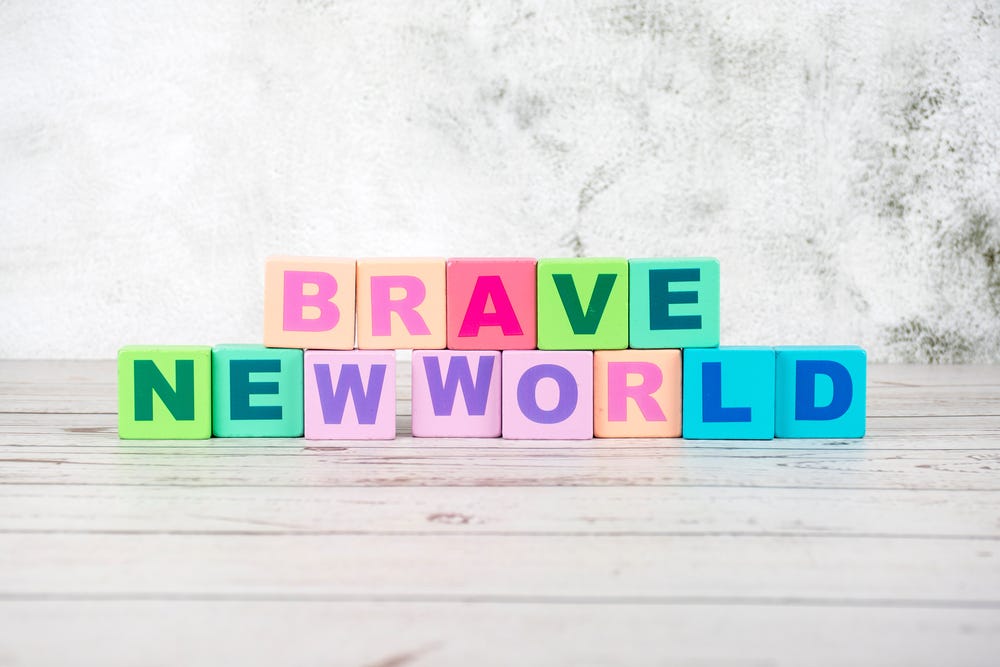E-Pluribus | October 5, 2023
The future of free expression; slouching towards Huxley; and turning down the temperature of our discourse.
A round-up of the latest and best musings on the rise of illiberalism in the public discourse:
Chimamanda Ngozi Adichie: ‘I Worry That What We’re Looking at Is the End of Curiosity’
Children’s book author Chimamanda Adichie considers the “progressive left” her “tribe.” She’s nonetheless alarmed that certain ideas are now forbidden among her supposedly open-minded allies. In an interview published at The Atlantic, Adichie says that protecting free expression for all is a necessary part of maintaining personal freedom, regardless of the potential for offense.
[Chimamanda Ngozi Adichie]: It seems to me that there is a massive decline today in compassion and in moral courage. And I think that, in some ways, both are connected. On social media, there’s an expectation that you will not get compassion: You tweet something, and then people are coming at you, even your friends. I think it makes people hold back. And then, of course, the moral-courage part of it is that there are people who could speak up, and they don’t. I think what’s happening now—the books that are not being published; you open the newspapers and often there’s someone who’s been dropped from something—it’s often not because those in positions of authority really believe that what has been said was bad. It’s because they’re afraid of themselves being attacked.
With this kind of social censure hanging over people, it’s so much more difficult, I think, to create, to write. And you can see that even in the small space of a workshop—I constantly have to say to people, It’s okay. You can actually write that. Because you can see that they’re very worried about what the people in the workshop are going to think. I wish people would read more, and particularly read more imaginative writing. I think maybe it would make us a bit more compassionate.
[. . .]
[T]he role of a storyteller is to imagine what a human being is thinking and feeling. If we don’t have our storytellers feeling free, we’re losing something. And then the generations who will come after us, I think they’re going to just be startled. You know, we look back and we read—we read Dickens, and I read Balzac, and I get a sense of what life was like then. I wonder if people reading contemporary writing today will get a true sense of what our lives are like.
And I’ll tell you this without naming names. I wrote my first children’s book, and I had been asked to do an interview with a very respected media outfit in America. And a few days before the interview, my publisher tells me, Oh, I’m so sorry. They just said they cannot go forward with the interview. And I said, Oh, why? And they said, Well, because they think that they cannot interview you if you’re not willing to address the comments you made in 2017 about trans women. And I was so stunned by that. I thought, Well, I wrote a children’s book. And I think what stunned me even more was the willingness of this media organization to be open about the reason that they were canceling the interview. And I have to say, I was kind of hurt. But also, it made me start to understand how certain people can choose not to speak out. I did an interview in 2017 in which I said, I think a trans woman is a trans woman. And I think that because I think it’s so important for us to make distinctions, because I, as a person who was born with a body designed to create a certain size of gametes, that has completely shaped my life. You know, actually, before I was born, my father’s family said to my mother, We hope it’s a boy. To which my mother said, Well, you know, I’ll have whatever I have. My mother was wonderful. But I grew up in a culture in which, because I’m a woman, I cannot inherit property, all of those things. So it’s shaped so much of my life. And I said that not at all thinking that I was causing offense at all, not intending to cause offense. But I also understand that it’s possible to cause offense without meaning to. And so afterwards, I was so taken aback. I mean, it was just really horrible. I took to my bed for two weeks. I don’t like to talk about it, because I don’t like to cast myself as a victim. It’s almost impossible to talk about this with nuance without being accused either of Oh, you’re making yourself the victim or Oh, you’re so insensitive. And that, in some ways, maybe is why I’m saying this, because I want to make a case for more nuance. And also a case for maybe more holistic thinking, because I remember thinking, Well, why would anybody think that I meant harm? Because people said, Well, you’re creating a hierarchy. People said, You’re a murderer. And I thought, My whole life has been about the celebration and the embrace of diversity, and I love the idea that we are different in the world.
Read it all.
Tomasz Witkowski: Towards a Brave New World
Are we headed for an era where an honest day’s work is devalued and degraded? Tomasz Witkowski writing for Quillette says yes, and it’s not the first time in history it’s happened.
There have been many periods in human history when work was held in contempt. The ancient Greeks believed that it was the domain of slaves, and that free people should occupy themselves with physical exercise to improve the body and philosophy to improve the mind. However, it is worth considering that in reality this attitude would be impossible without taking away the freedom of most people currently living. Likewise, it would be impossible for many representatives of the aristocracy who lived off the work of their subjects to manifest their disgust of work, even though every bite of food they ate, every sip of wine they took, and every swash of lace decorating their exquisite clothes had its origins in someone else's labour.
The work ethic most often collapsed due to economic factors, wars, and natural disasters. Cultural changes have also contributed to this situation. Deriving job satisfaction in such conditions is extremely difficult. Even if it initially brings satisfaction and joy, work perceived by the environment as exploitation will, under the influence of contempt, quickly become an onerous duty, and the person performing it will be transformed into a loser. The same applies to work performed under duress. At the turn of the 20th and 21st centuries, some psychologists also contributed to the degradation of activities hitherto defined as work.
[. . .]
Decades of communism, which often mandated hard, senseless, and inefficient work, did not manage to kill the work ethos among its people. This was shown by the period of political transformation, during which, inhabitants of post-communist countries were able to find the meaning of life in work, rediscover motivation for achievements, and feel satisfaction from having an effect on reality. Currently, taking advantage of the freedom gained, the inhabitants of these countries are probably using the work ethos more willingly and effectively than ever before.
The challenges humanity faces today require people who are dedicated to resolving social and political conflicts, and who will tirelessly search for technologies that will reverse the effects of the ecological degradation and for ways to overcome demographic crises. Will they come from the generation that denigrates the search for the meaning of life in work? Will they emerge from the mass of those focused on quiet quitting, obsessively searching for and maintaining a work-life balance, and ensuring themselves ever more entertainment? Will the accumulated social capital of contempt for work not crush them sooner than they show themselves?
Like most authors of dystopian fiction, Aldous Huxley intended Brave New World as a warning. Nevertheless, we are systematically moving in the direction he indicated. We have certainly achieved this in the consumption of communal entertainment, communal pleasures, and ambitions pursued at work. Those who continue to deviate from cultural norms requiring contempt for work will soon die out.
Read it all here.
Dunja Trunk: Navigating Heated Classroom Discussions
Although written as “Tips for Educators,” this essay from Dunja Trunk at Faculty Focus has broader application. Trunk provides ideas for teachers facilitating contentious classroom discussions to help students focus on the problem, not on personalities.
While open dialogue should be encouraged, there should be boundaries in place to prevent discussions from spiraling into unproductive or offensive territory. If a conversation becomes disrespectful or veers off-topic, teachers should gently redirect the discussion back to the core issues and remind students of the ground rules for respectful communication. Establishing a supportive classroom culture early in the class helps ensure that discussions remain civil and productive.
Demonstrating how to regulate strong emotions during a challenging discussion is another important role of instructors. If students make inflammatory remarks or launch personal attacks, educators should remind them of the rules of respectful discourse and encourage them to take a break and a few deep breaths. When emotions run high, it’s also okay for teachers to give the whole class a break and to take a moment to gather themselves.
Instructors should explain the value of diverse opinions and varied perspectives. The goal is not to make everyone in the class agree on a given issue but rather to have a constructive conversation. Reminding students – frequently – of the importance of active listening is vital. Educators could even role-play how to discuss controversial topics in a constructive manner and how to disagree respectfully. Students are empowered to engage in meaningful discussions when they have been taught the skills to do so by supportive teachers.
Heated discussions can be triggered by topics related to power and privilege. Issues of privilege and marginalization should be approached with sensitivity and by acknowledging the experiences of those affected. Students should be encouraged to think about their own biases and consider viewpoints that contrast with their own. A willingness to challenge one’s own beliefs is essential for constructive discourse.
Read the whole thing.
Around Twitter
Via Free Black Thought, ex-non-binary Kiyah Willis on her journey away from radical gender ideology:
Via Christopher Rufo, some surprising news from Robin DiAngelo: no one is "any less or more racist than anyone else"! So as Syndrome of The Incredibles movie might put it, With everyone racist, no one will be.
And finally, here’s Zaid Jilani with a novel proposal for alternative DEI training:










